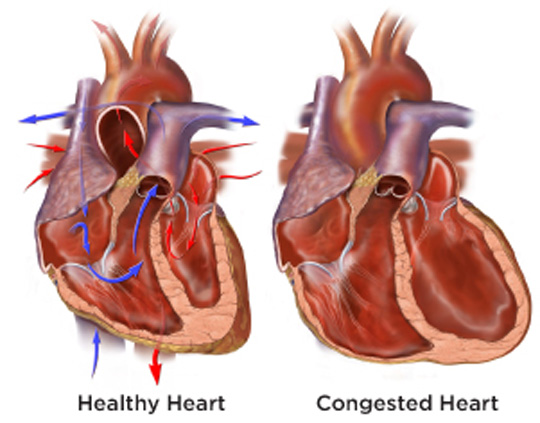


CHF or congestive heart failure is a condition of the heart that affects its pump function. This renders it unable to meet the demands of the body. There are a myriad of conditions that can affect the pumping efficiency of your heart to cause congestive heart failure. For this reason, diagnosis is not a one-size-fits-all affair. The doctor has to examine your medical history, take you through a physical exam and several lab tests. This is a serious condition that is hard to treat and manage. So, how long can you live with congestive heart failure?
 So, how long can you live with congestive heart failure? Statistics paint a grim picture – the annual mortality rate for those with cognitive heart failure is 10%. However, statistics also show that between 20% to 30% victims live longer than 10 to 12 years.
So, how long can you live with congestive heart failure? Statistics paint a grim picture – the annual mortality rate for those with cognitive heart failure is 10%. However, statistics also show that between 20% to 30% victims live longer than 10 to 12 years.
In fact, it is impossible to give exact answers to "how long can you live with congestive heart failure". If your condition is deteriorating such that you are always in hospital and your organs are failing, then the best you can do is a few months.
While living with congestive heart failure is challenging, many of those who succumb are usually in their old age and are very sick when they receive their diagnosis. Depending on what caused the condition and its severity, you may have a long life ahead of you if you follow through with treatment. However, you will need to make a lot of lifestyle changes to improve your chances of survival and your health.
Heart failure is usually a result of the weakening and damaging of your heart by other diseases. However, it can also be caused by stiffening of the heart muscles. In a typical case of heart failure, the main chambers of the heart become weakened and damaged. The ventricles dilate making the heart incapable of pumping blood efficiently throughout your body.
CHF is a silent killer as you won’t notice any symptoms in the early stages. You will, however, experience gradual changes in your health as the condition worsens. Here is a breakdown of the symptoms:
Initial symptoms
When the condition worsens
When CHF is severe
Instead of asking “how long can someone live with congestive heart failure?” focus should be on how to live with the condition so as to prolong your life.
You need to watch your weight with the guidance of your doctor. Usually, weight gain could mean that you are retaining too much fluid and hence there should be a change in your treatment plan.
You should make a point of checking your ankles, feet and legs for swelling on a daily basis. Should swelling occur, check with your doctor.
Eat a balanced diet that includes vegetables, fruits, fat-free dairy products, whole grains and lean proteins. You should also limit the amount of salt in your food. The sodium in salt contributes a great deal to water retention in the body. Consequently, your heart works harder than usual leading to swollen legs, feet and ankles as well as shortness of breath.
You should avoid smoking, fats and cholesterol, as well as alcohol. Smoking can damage your blood vessels, raise the blood pressure, increase your heart beat rate and limit the amount of oxygen getting to the blood. A high cholesterol and fat diet contributes a great deal to heart failure. Avoid alcohol as it will interact with the medication you are taking and can weaken the muscles of your heart.
It is important to work out regularly as it keeps your body healthy, hence reducing the demands on your heart. You can work with your doctor to develop a workout program.
When you are stressed, your heart tends to beat faster, your blood pressure shoots, and your breaths become heavier. This can have a negative impact on your heart. Find creative ways of managing stressful situations in your life. You can take a nap or spend time with family and friends.
Try to get a good night’s sleep every day. If you’re unable to sleep due to shortness of breath, prop your head up using a pillow. If you are using diuretics, you should consult with your doctor on changing the time for taking them. Diuretics increase the urge to urinate and can therefore interfere with your sleep if you take them at night.